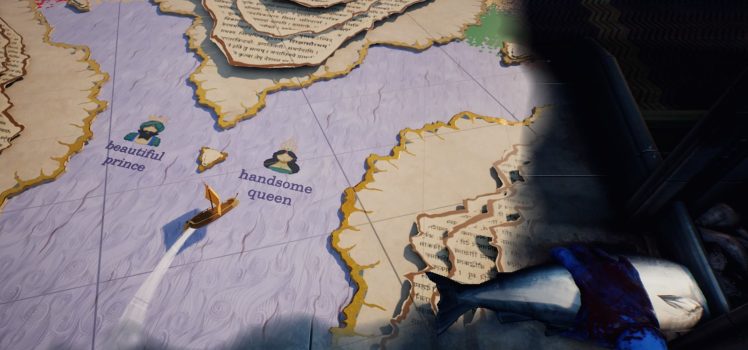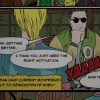What Remains of Edith Finch is Ambiguous.

Any interview with Creative Director Ian Dallas will include three things: 1) the interviewer’s pronouncement of her favorite character in What Remains of Edith Finch, 2) the interviewer’s demand for closure regarding that favorite character’s death, and 3) Dallas’s refusal to comply with the question.
It’s quite amazing how consistently present these elements are. It turns out, ambiguity makes people uncomfortable. And Ian Dallas doesn’t like people[1]okay, this part probably isn’t true. See, What Remains of Edith Finch is a video game about openness and interpretation and building a mythos. A concrete What Remains of Edith Finch is not What Remains of Edith Finch. But this reality doesn’t stop fans of the game from begging Dallas for resolution.
Dallas himself will claim that his reason for holding back on absolutes is because even he doesn’t know for sure how the characters die in the game. Generally, when I hear creators distance themselves from answers in this way, I assume laziness. Shouldn’t a creator be responsible for his creations? Sure, art, and therefore the artist, isn’t required to provide answers, but I do feel that when pressed the artist should be obligated to defend the art.
But with What Remains of Edith Finch ambiguity—and therefore discomfort—is the very point [2]okay, so maybe Dallas does hate people. This game is the rare case where a work’s purpose is to expose ambiguity and does so by trafficking in the ambiguous [3]how very meta. But why am I okay with a dodgy artist here but not okay in other settings, like when my response to a question at an author reading floats among variations of “it’s up to you”, padded out with several words ending in -ism that aren’t so much meant to answer the question but to shroud the answer as a reaction to pressure[4]Yes, I’ve endured many of these. Author readings are usually painful to sit through. Likely my own readings included.
I think I approve of Dallas’s dodges because What Remains of Edith Finch is crafted toward the ambiguous rather than being ambiguous as a point of existence. The world and the characters are defined (unambiguous) so that the narrative ambiguity can resonate. By comparison, with the bloated, masturbatory works of our aforementioned author-ism friend, the audience’s inherent questions are “…question(s) without a path toward an answer” and are “…abstract, non-objective, and simply exploratory.”[5]Yep, I just quoted myself. That’s probably just as bad as being an author-ism
I won’t deny that the line dividing interesting ambiguity and masturbatory ambiguity can be temptingly dotted at times. It’s easy, especially for amateur creators, to plead philosophical depth in the face of concrete questions Thankfully, we have professionals like Ian Dallas and Edgar Allan Poe to show us the way.
I won’t get into the details of Poe’s short story writings here. Just know that his stories are often described as strange, hallucinatory, weird, and mysterious. Poe leverages ambiguity for a specific effect. In the article “Ambiguity as Aesthetic Strategy: Edgar Allan Poe’s Ambitions for the American Short Story” Wanlin Li says:
…ambiguity actually works for Poe’s purpose, since it strengthens authorial control by way of forcing the reader to grapple more with parallel interpretive possibilities. In other words, in cases of ambiguity, Poe seeks the unity of effect not at the level of stable meaning, but at the level of making the reader aware of instability.[6]JNT: Journal of Narrative Theory 48.2 (Summer 2018): 165.
Poe, just as Dallas would do, doesn’t actually want the audience to determine which of the parallel interpretive possibilities are “correct,” but rather he wants the audience to accept that parallel interpretive possibilities are possible.
So when Dallas deflects questions about the true causes of his character’s deaths, he’s perhaps not dodging. He’s moving out of the way so you can see the rest of the possibilities.[7]Though, I do believe Dallas has a version of absolute resolution locked away in his brain. He just knows that to expose it would mean toppling the delicate intent of the game. He’s created … Continue reading
Footnotes
| ↑1 | okay, this part probably isn’t true |
|---|---|
| ↑2 | okay, so maybe Dallas does hate people |
| ↑3 | how very meta |
| ↑4 | Yes, I’ve endured many of these. Author readings are usually painful to sit through. Likely my own readings included |
| ↑5 | Yep, I just quoted myself. That’s probably just as bad as being an author-ism |
| ↑6 | JNT: Journal of Narrative Theory 48.2 (Summer 2018): 165. |
| ↑7 | Though, I do believe Dallas has a version of absolute resolution locked away in his brain. He just knows that to expose it would mean toppling the delicate intent of the game. He’s created something that drives people crazy, and he has the ability to put those people at ease, but if he does this, his creation dies. Not an enviable position. (see, even I’m not immune to demanding resolution) |


